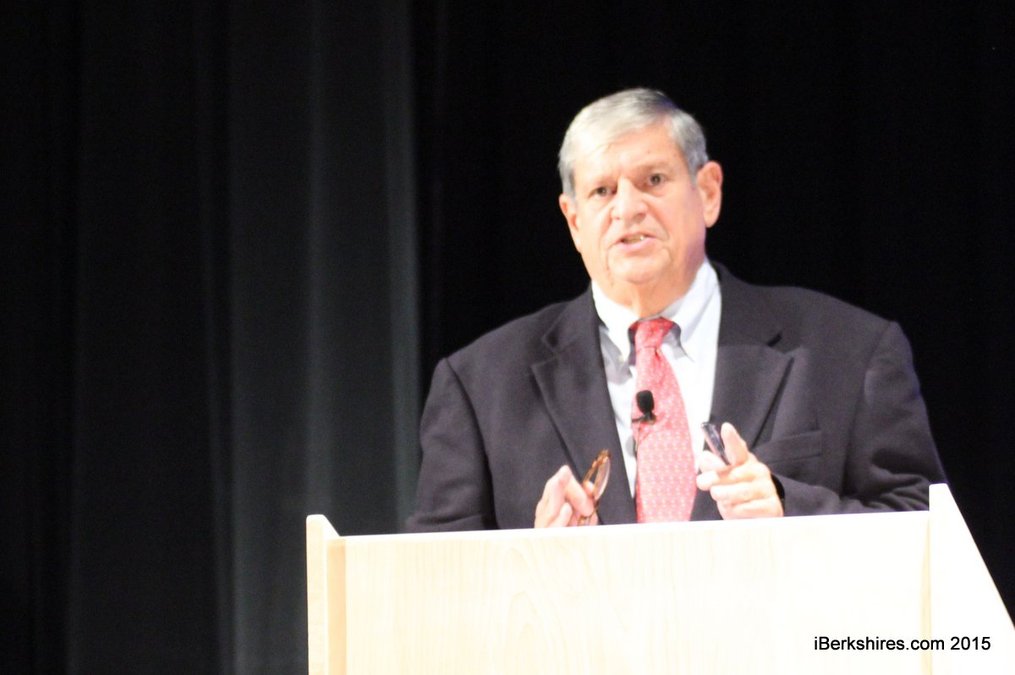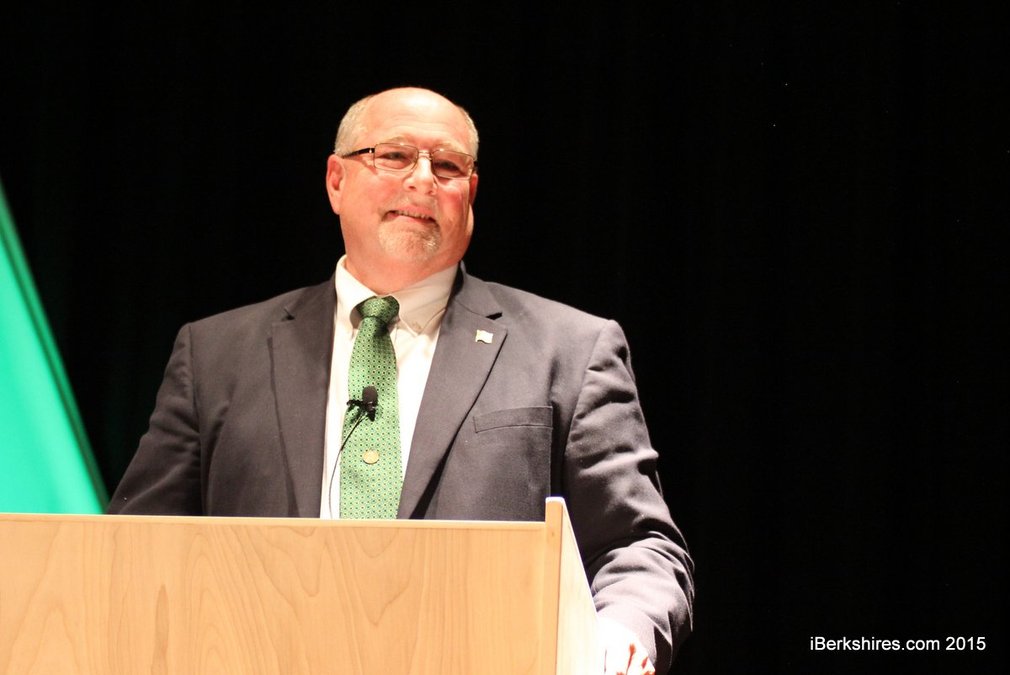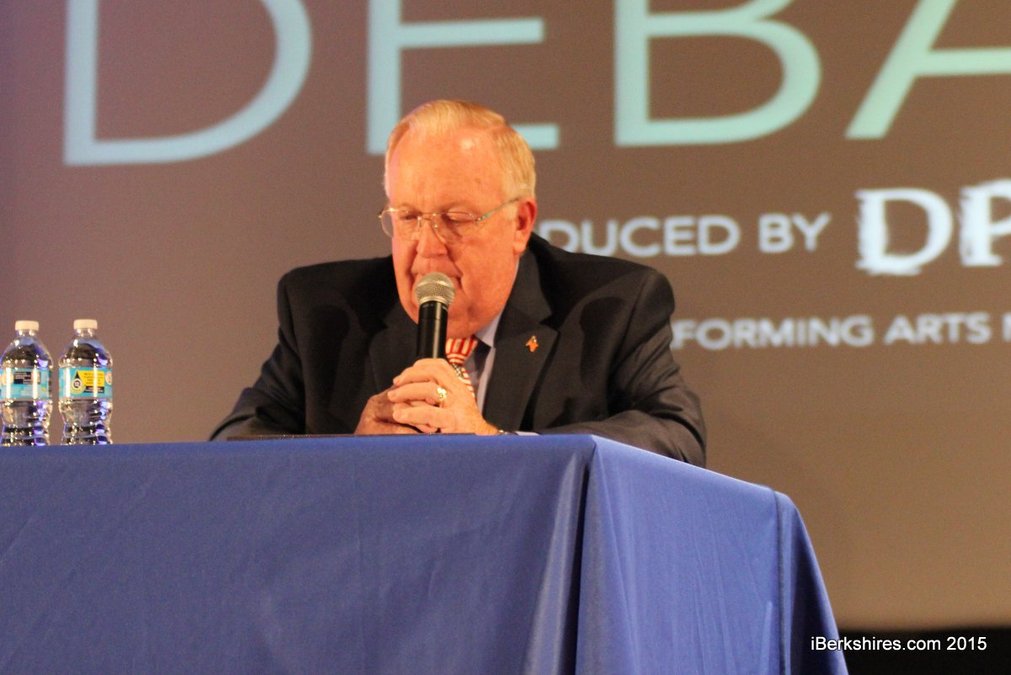


Alcombright, Barrett Rehash Old Battles, Spar Over Priorities
 |
NORTH ADAMS, Mass. — The mayors — past and present — traded jabs during a 90-minute debate on Tuesday night that touched on crime, economic development and infrastructure in North Adams.
Richard Alcombright and John Barrett III took to the stage at Drury High School before a packed auditorium in their first one-on-one debate since clearing the preliminary election four weeks ago.
The word war became heated at times, as the crowd cheered, jeered or applauded. Barrett's supporters gave him standing ovation in the end.
"I'm getting nervous sitting in the middle," joked moderator Paul Hutchinson as the debate wound down.
There were few surprises as the candidates trod familiar ground; Barrett had served 26 years before being ousted in 2009 by Alcombright, whose next two challengers echoed his predecessor.
Both candidates returned over and over again to financial battles from four and six years ago, with Barrett insisting he had left plenty of reserves and Alcombright that it had been a deficit. They also quibbled over whether the downtown was worse or better than it was six years ago.
"The decision to run for mayor was not easily made," said Barrett in his opening remarks. "There were too many people asking me to consider running this year. They thought the city was heading in the wrong direction."
Alcombright said his tenure over the past six years had focused on fiscal responsibility, transparency, revitalization and respect for citizens. "You will always have a voice that will be respected, whether we agree or disagree," he said.
The incumbent pointed to accomplishments including recent announcements of ventures at the Greylock Mill and Redwood Motel and plans for a proposed for-profit art museum, a budget in line with the city's actual revenues and the nearing completion of the controversial Colegrove Park Elementary School, which elicited some boos from the audience.
The challenger called for police substations to combat increasing crime, a code enforcement officer to crack down on blight and the use of Community Development Block Grant funding to tear down structures. He said he would have greater transparency, calling Alcombright's efforts in that regard "a scam."
"We will push very hard for transparency," Barrett said, adding he would make more meeting minutes and budgets available. He also blamed local media in part for not asking enough questions. "The press has failed miserably."
Alcombright objected, saying he had provided far more access to government through meetings, the press, social media and online postings.
"I lived under Mr. Barrett's leadership and everything I had to fight for," said the former councilor.
The two also sparred over the condition of Western Gateway Heritage State Park, with Alcombright describing it as "deplorable" and Barrett insisting he had invested hundreds of thousands into the buildings.
"How can you stand there and say it was neglected for 30 years — we only had it for 20," retorted Barrett. "That park was making money ... we were successful for 20 years, that's good management. ... None of those are profitable today."
Alcombright defended his efforts to privatize the park despite the failure of a much-touted plan by a development group.
"We had a good plan ... but it didn't provide the tax revenue," he said. "It makes no sense for the city to be competing with the private sector... put them back on the tax rolls."
Barrett also rejected any responsibility in the $300,000 judgement filed against the Redevelopment Authority by Freight Yard Pub, again referencing a Christmas card he'd gotten from the owners. Alcombright said the lawsuit hanging over the park had played a role in the loss of the investment group.
Both agreed that the Mohawk Theater was an important investment for the downtown but offered little in the way of proposals for it; Alcombright prefers a plan that will have Massachusetts College of Liberal Arts involved, Barrett that it could have performances to draw people downtown.
With the city facing some $60 million in infrastructure needs, Alcombright said the city should do a "pay as we go" until its finances stabilize and debts fall off. "We can fix what we need to fix and 2-3 years, we will be able to fund some capital repairs."
Barrett intimated that Alcombright should have floated a bond to start fixing things, referring to a $3 million bond he'd done years ago to fix roads and sidewalks. He also questioned where the revenue from the sewer fee had gone, if not to fix pipes.
"In 26 years, $3 million doesn't speak to repairs," retorted Alcombright. "The sewer fee was intended to get us out of the $3 million deficit."
The candidates split frequently on topics, with Alcombright wondering why Barrett was against the proposed skateboard park while at the same time touting the skating rink and Armory as important for youth.
"I really don't understand the the real difference in creating a venue for our kids," he said.
Barrett dismissed the recent branding and marketing plans as "Pretty little signs and they're not going to create any jobs."
That was the real issue, he said. "We have to start creating new jobs."
"They're all about people visiting us," he said, adding his concerns were that young families would be able to find jobs and buy homes. "When are we going to start thinking of the people who live here?"
At one point he berated the panel for not asking about economic development ("What we've got to be talking about is the real issues here.") despite being asked several related questions, including "how will you create jobs?"
Alcombright several times raised the specter that should Barrett be returned to office, he would not as collaborative or open.
"I have this real fear that if Mr. Barrett comes back into office we'll be back to a government of one again," said Alcombright.
Barrett admitted he could be "passionate," but that he couldn't force other officials to do anything, claiming he had "never called" a board member to tell them how to vote.
"You could have voted anyway you wanted," he told Alcombright. "It's a democracy ... ."
"It is now," retorted Alcombright to applause.
The candidates will meet again on Tuesday, Oct. 27, at 10 a.m. in a debate broadcast on WNAW.
Tags: debate, election 2015, NorthAdamsElection,
















